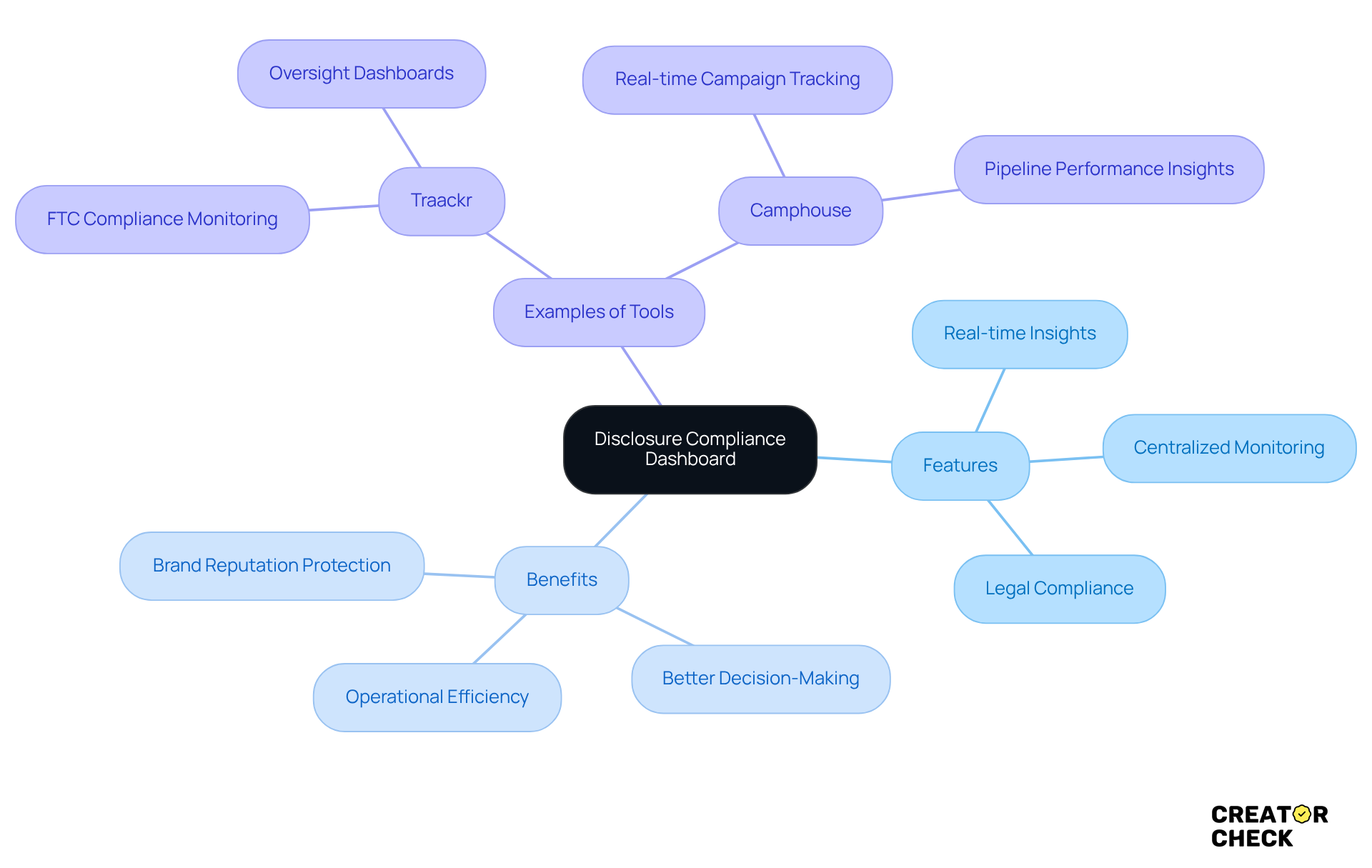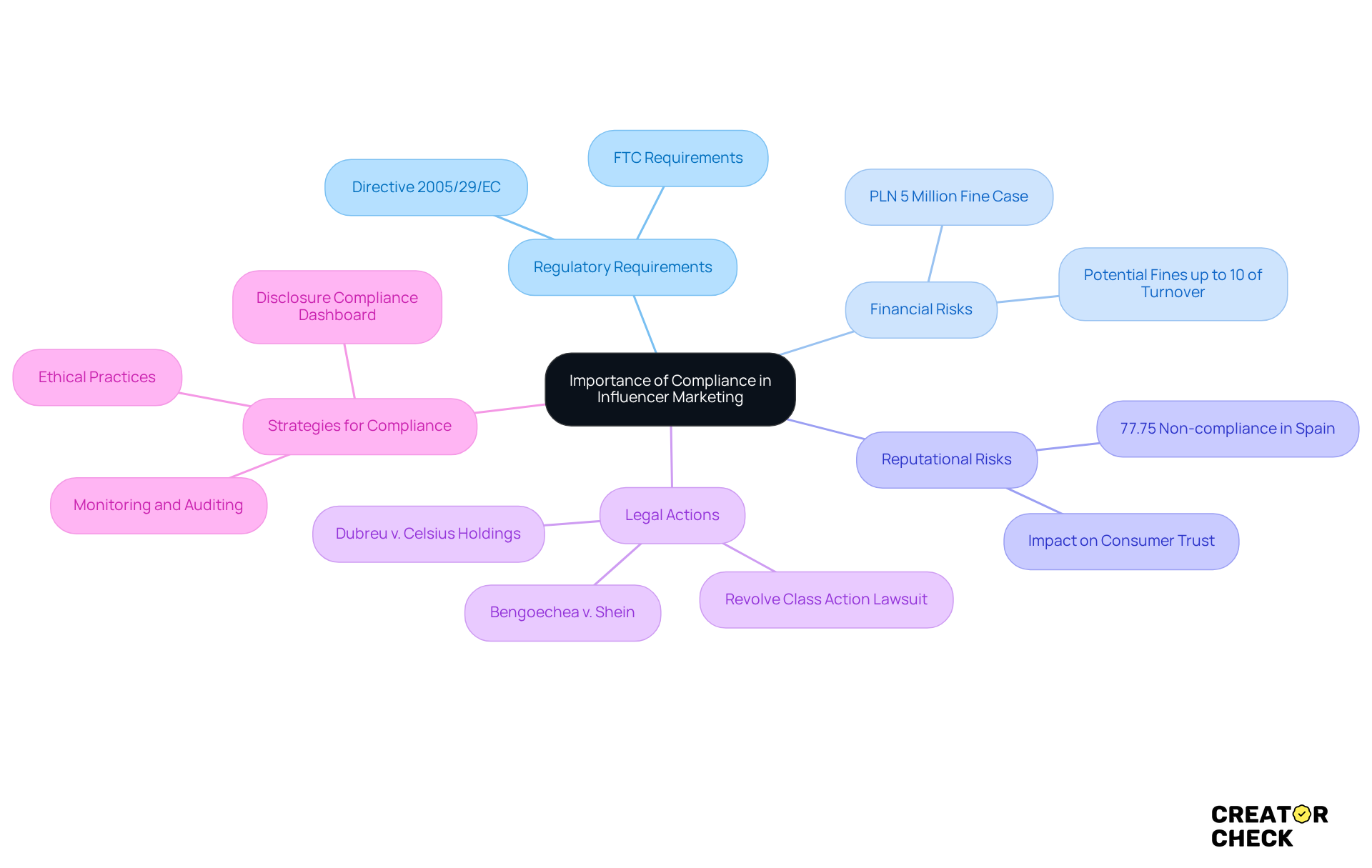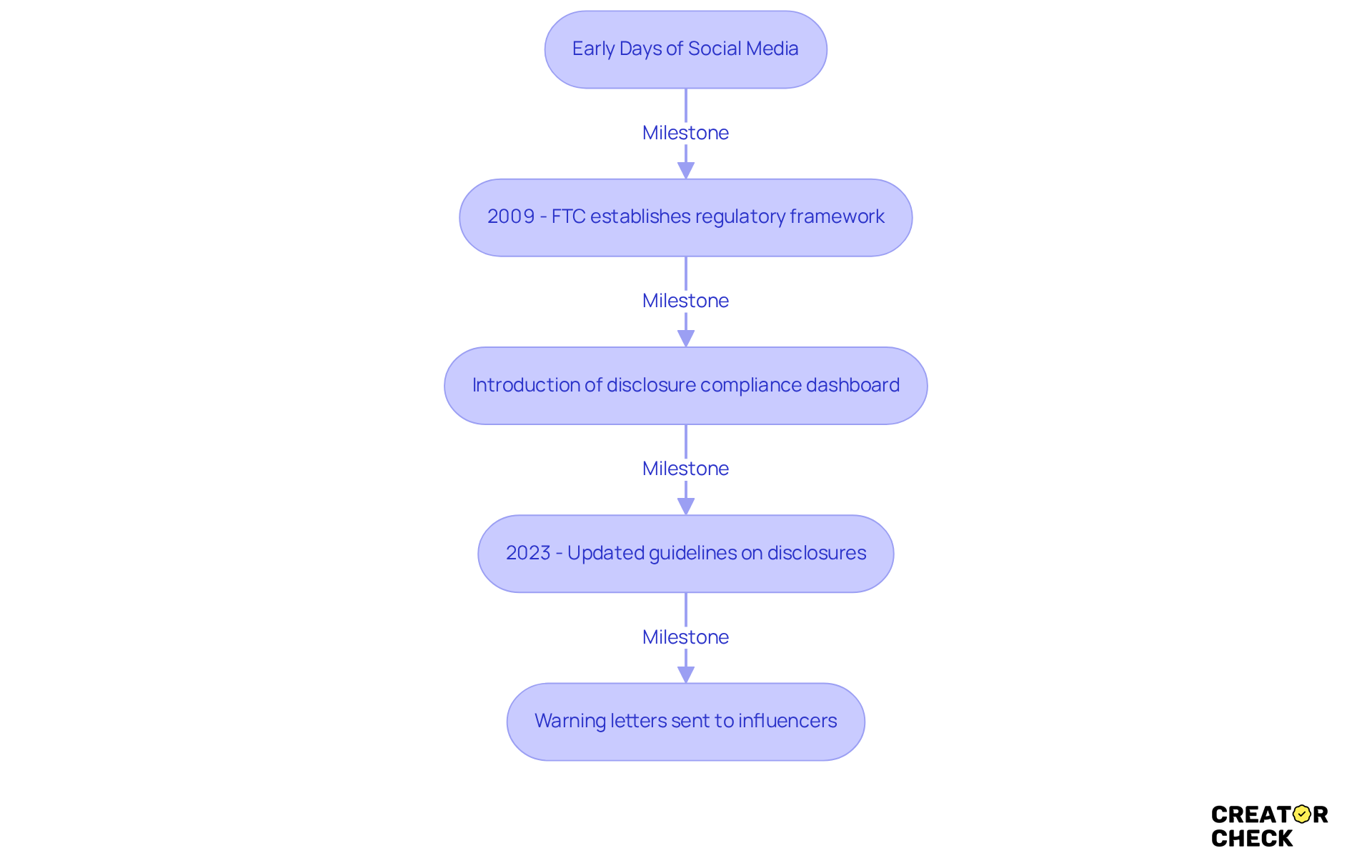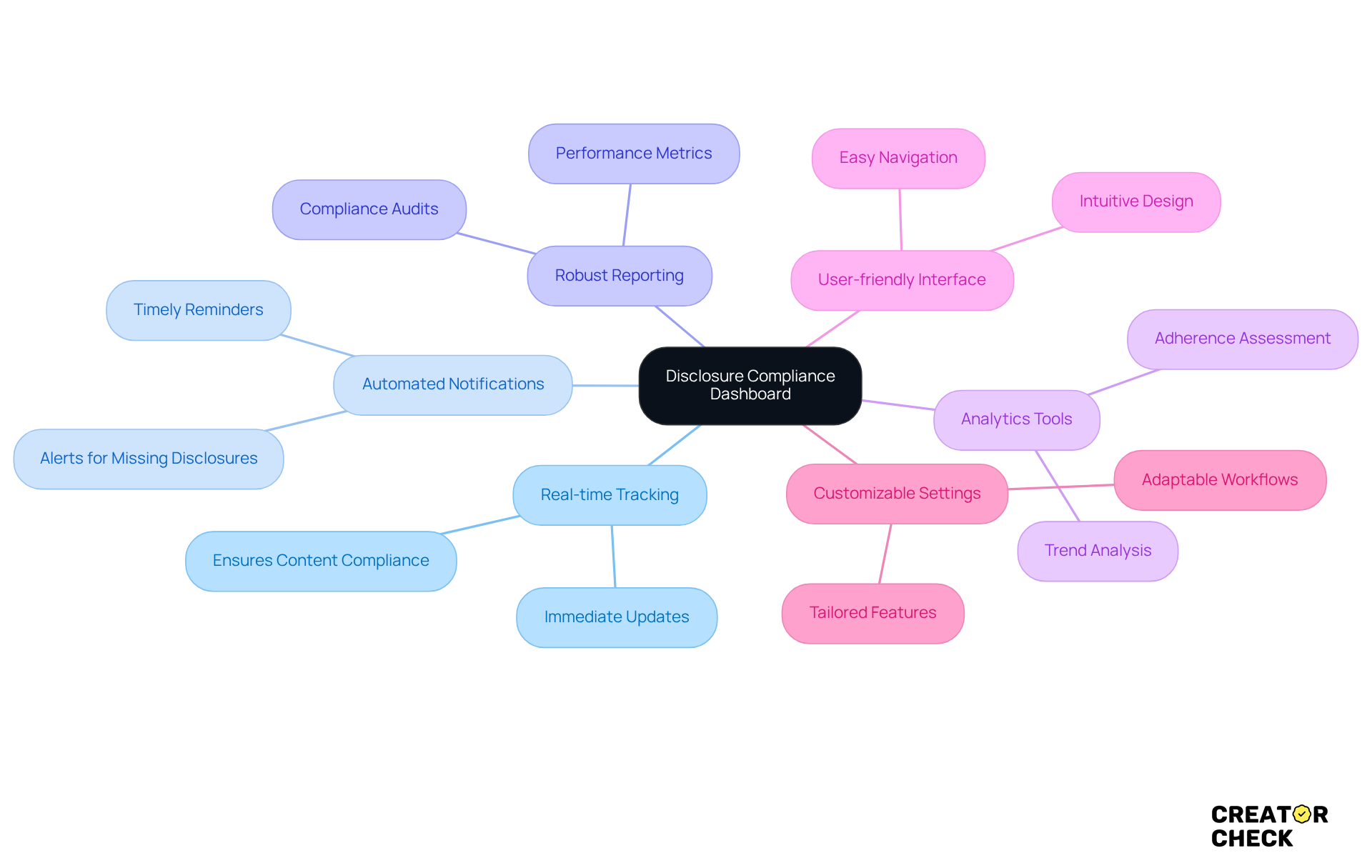Overview
A disclosure compliance dashboard for influencer teams is like your go-to digital buddy, designed to keep an eye on and ensure everyone sticks to the legal and ethical standards for sponsored content. You know, especially those set by the folks at the Federal Trade Commission (FTC).
So, what does this mean for you? Well, these dashboards not only help you track and report compliance in real-time but also play a crucial role in reducing the risks that come with non-compliance. This way, you can protect your brand from potential legal headaches and build trust with your audience. Isn’t that a win-win?
Introduction
A disclosure compliance dashboard for influencer teams is becoming an essential tool in the tricky world of social media marketing, where sticking to legal and ethical standards is super important. This innovative solution not only brings monitoring efforts together in one place but also boosts transparency, ultimately building trust between brands and their audiences. But here’s the thing: as regulatory scrutiny ramps up and consumer awareness increases, you might be wondering—how can brands really use these dashboards to reduce risks and ensure compliance in a constantly changing digital marketplace? Let’s dive into this together!
Define Disclosure Compliance Dashboard for Influencer Teams
A disclosure compliance dashboard for influencer teams acts as a centralized digital tool that tracks and oversees adherence to legal and ethical disclosure standards in promotion. This dashboard brings together data related to sponsored content, making sure that influencers stick to guidelines set by regulatory bodies like the Federal Trade Commission (FTC). By offering real-time insights into adherence status, the dashboard helps agencies and companies minimize risks linked to non-adherence, safeguarding their reputation and steering clear of potential legal troubles.
With the rise of social media marketing, the need for compliance tools has become more pressing, especially since many B2B campaigns find it tough to follow advertising disclosure rules. For instance, a marketer managing promotional activities across different brands struggled to ensure proper disclosures, highlighting the need for a centralized system. By leveraging technology to monitor social media personalities' activities, we not only streamline the monitoring process but also boost transparency, which is key for building lasting trust with audiences.
Digital tools like Traackr and Camphouse showcase the latest trends in influencer marketing regulation. Traackr enables organizations to create oversight dashboards for each label, making it easier to keep an eye on thousands of influencers all in one spot. This feature is crucial for quickly spotting influencers who don’t disclose sponsored posts, helping to avoid potential FTC sanctions. On the other hand, Camphouse gives real-time visibility into campaign spending and pipeline performance, connecting campaign data to outcomes and allowing for timely adjustments.
The perks of using a disclosure compliance dashboard for influencer teams go beyond just ticking boxes; they include enhanced operational efficiency and smarter decision-making. By centralizing compliance efforts, teams can utilize a disclosure compliance dashboard for influencer teams to regularly audit published content, ensuring they adhere to disclosure rules and protect their brand's reputation. As the landscape of social media promotion continues to evolve, incorporating such dashboards will be vital for maintaining transparency and trust in partnerships with content creators. So, what does this mean for you? It’s all about building a better, more trustworthy relationship with your audience!

Contextualize the Importance of Compliance in Influencer Marketing
The importance of compliance in influencer marketing is escalating, especially with the implementation of a disclosure compliance dashboard for influencer teams, as regulatory scrutiny increases and consumers become more aware. The Federal Trade Commission (FTC) requires clear disclosures for sponsored content, and not following these rules can lead to hefty penalties.
Take, for example, Poland's national competition authority, which recently slapped a dietary supplements manufacturer with a PLN 5 million fine (that’s around USD 1.25 million) for misleading advertising. This really highlights the financial risks companies face when they don’t stick to compliance standards. Did you know that about 77.75% of social media content analyzed in Spain didn’t meet disclosure requirements? That’s a significant issue that can seriously damage a company’s reputation.
But the fallout from non-compliance doesn’t stop at penalties. It can also lead to legal actions that tarnish a company’s image. A prime example is the class action lawsuit against Revolve Group, where influencers reportedly didn’t disclose their paid relationships, misleading consumers and resulting in claims for $50 million in damages. These incidents show just how serious the legal risks can be and how they can erode consumer trust.
Experts agree that committing to ethical promotional practices not only helps reduce these risks but also enhances the disclosure compliance dashboard for influencer teams, which in turn boosts customer loyalty and trust. In a world where authenticity is key, maintaining transparency in partnerships isn’t just about following the law; it’s a smart strategy that can help companies stand out in a crowded market.
As the promotional landscape continues to evolve, establishing a disclosure compliance dashboard for influencer teams is essential for protecting your brand’s reputation and ensuring long-term success. So, how are you approaching compliance in your influencer marketing efforts?

Trace the Evolution of Compliance Requirements in Influencer Marketing
The world of compliance standards in social media promotion has really evolved since the early days of social platforms, right? Back then, casual endorsements were the norm. It was in 2009 when the Federal Trade Commission (FTC) kicked off its regulatory framework, emphasizing the need for clear disclosures in sponsored content. As the marketing landscape expanded, the FTC adapted its guidelines to meet new challenges, including the rise of micro-promoters and the complexities of different social media platforms, by implementing a disclosure compliance dashboard for influencer teams. Fast forward to 2023, and the FTC rolled out updated guidelines that require influencers to be more upfront about free products or discounts. This move reinforces the importance of transparency and consumer protection, particularly through the use of a disclosure compliance dashboard for influencer teams.
So, what does this mean for you? Well, this shift is part of a larger trend towards accountability in advertising practices. Did you know that:
- 80% of marketers believe that partnerships with social media figures are beneficial for business?
- 86% of consumers make a purchase inspired by a social media figure at least once a year?
That's pretty significant!
Additionally, the FTC's focus on compliance is evident from its actions related to the disclosure compliance dashboard for influencer teams. For instance, in 2023, the agency sent warning letters to health influencers on TikTok and Instagram for failing to disclose paid endorsements. This lack of transparency not only undermined trust but also led to some negative press. As the marketing industry is projected to grow to $32.55 billion by 2025, with 76% of marketers planning to allocate a budget to this type of marketing, it’s evident that these evolving guidelines reflect the increasing importance of upholding ethical standards and building consumer confidence in brand endorsements.
So, as you navigate this landscape, remember that staying informed and compliant can really pay off!

Identify Key Features of a Disclosure Compliance Dashboard
Key aspects of the disclosure compliance dashboard for influencer teams include real-time tracking of creator content to ensure it aligns with disclosure guidelines, automated notifications for any missing disclosures, and robust reporting functionalities. These dashboards often connect with social media platforms, helping you track posts and make sure all sponsored content is labeled correctly. Plus, they might offer analytics tools to assess how well adherence efforts are working and spot trends in influencer behavior.
So, what does this mean for you? With Creator Check, security is a top priority, thanks to enterprise-grade encryption that keeps sensitive information safe. This allows agencies to manage multiple inboxes from different providers without a hitch. And don’t worry—we comply with GDPR and other data protection standards, reinforcing our commitment to keeping your data private.
User-friendly interfaces and customizable settings allow teams to tailor the disclosure compliance dashboard for influencer teams to their specific needs, boosting operational efficiency when managing compliance across various campaigns. This streamlining not only helps in managing compliance but also works to enhance revenue. How cool is that?

Conclusion
A disclosure compliance dashboard for influencer teams is an essential tool that helps ensure everyone sticks to the legal and ethical standards in influencer marketing. By centralizing the monitoring of sponsored content, these dashboards not only reduce the risks linked to non-compliance but also boost transparency and trust between brands and their audiences. As influencer marketing keeps growing, having such dashboards is becoming increasingly vital for protecting brand reputations and building genuine connections with consumers.
Throughout the article, we've highlighted key insights that showcase the importance of compliance in influencer marketing, especially with the evolving regulations and the increased scrutiny from organizations like the FTC. The discussion points out the financial and reputational risks that come with non-compliance, illustrated through real-world examples of penalties and lawsuits. Plus, we've traced the evolution of compliance requirements, showing how the landscape has changed since the FTC's initial guidelines, leading us to the necessity for tools that make compliance monitoring easier.
So, what does this mean for you? The establishment of a disclosure compliance dashboard isn't just a regulatory obligation—it's a strategic advantage in the competitive world of influencer marketing. By prioritizing compliance, brands can not only dodge legal pitfalls but also boost consumer trust and loyalty. As the marketing sector continues to expand, embracing transparency in influencer partnerships will be crucial for long-term success and credibility. Companies are encouraged to invest in these tools to navigate the complexities of compliance effectively and build stronger relationships with their audiences.
Frequently Asked Questions
What is a disclosure compliance dashboard for influencer teams?
A disclosure compliance dashboard for influencer teams is a centralized digital tool that tracks and oversees adherence to legal and ethical disclosure standards in promotion, ensuring influencers comply with guidelines set by regulatory bodies like the Federal Trade Commission (FTC).
Why is a disclosure compliance dashboard important?
It is important because it provides real-time insights into adherence status, helping agencies and companies minimize risks associated with non-adherence, thereby protecting their reputation and avoiding potential legal issues.
What challenges do B2B campaigns face regarding advertising disclosure rules?
B2B campaigns often struggle to follow advertising disclosure rules, making it difficult for marketers to ensure proper disclosures across different brands.
How do technology tools like Traackr and Camphouse assist in compliance?
Traackr allows organizations to create oversight dashboards for monitoring thousands of influencers, helping to quickly identify those who do not disclose sponsored posts. Camphouse provides real-time visibility into campaign spending and performance, linking campaign data to outcomes for timely adjustments.
What are the benefits of using a disclosure compliance dashboard?
Benefits include enhanced operational efficiency, smarter decision-making, and the ability to regularly audit published content to ensure compliance with disclosure rules, thereby protecting the brand's reputation.
How does a disclosure compliance dashboard contribute to building trust with audiences?
By centralizing compliance efforts and maintaining transparency in partnerships with content creators, a disclosure compliance dashboard helps build a better, more trustworthy relationship with the audience.




